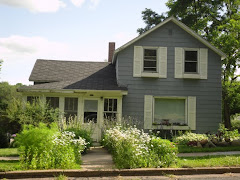 Mary Alice Calhoun, co-foundress, Gilbert House Catholic Worker
Mary Alice Calhoun, co-foundress, Gilbert House Catholic Worker So, Mary Alice Sunshine is seriously sick right now.
Illness is nothing new, here. Mary Alice became gravely ill during her early twenties. Diagnosed with uncontrollable endometriosis in her mid twenties, she was forced to quit work as a sou chef (which she loved) and, by the time she was thirty years old, she had had a total hysterectomy. At the same time that all of this was going on, Mary Alice was struck down with a searing, debilitating intractable migraine that just would not go away and that was untouched by any serious medication protocol. Even morphine and fentanyl were of no benefit. A harrowing inpatient trip to the Michigan Head Pain & Neurological Institute in Ann Arbor succeeded in quantifying her pain to the satisfaction of her doctors, but did nothing to help resolve the problem.
For those who are unaware Mary Alice is the driving force behind the Gilbert House Catholic Worker Community. It was Mary Alice who wanted the garden from which to feed people. Mary Alice was the one who wanted to be available for those who needed a mom, but didn't have one to rely on. Mary Alice was the artist in need of a gathering of other artists in community. Mary Alice was the one who craved Catholic fellowship and learning. Mary Alice wanted to *LIVE* Social Justice. So, it is no wonder that, a decade ago, when we went looking for a house and found a series of dumps to choose from in which to do all of the above--and I kid you not--she deliberately chose the very worst house we could find. It's like living with freaking Mother Teresa...without the funding...or a plan. In fact, the only thing that ever seems to really piss her off with regard to the running of the house is when, "that fat old dead guy," G.K. Chesterton "steals" our pittance gas money when wine-making season rolls around because, "that money could be used for stuff we actually need; no one needs wine."...I beg to differ.
...When we first started Gilbert House, Mary Alice started walking several miles a day to help control her pain. On good days she cooked for an army, cleaned, and went out to visit the neighbours, bringing them bread or cookies. That first Spring we began cutting in the garden, and collecting yard refuse from all over town to help build our soil. Mary Alice was the one who began quietly volunteering her time to do yardwork and garden pruning for our town's elderly, and hauling all of their yard scraps home on a tarp dragged down the street to add to our compost pile. Eventually, Mary Alice was nannying for a couple of the families in our local parish, and teaching art lessons to others. Even when she's busy with other things, her response to social justice issues is as profound as it is quiet. No one who has ever called us at four in the morning for help has ever been turned away or left hanging--and that's because of Mary Alice, not me, even though I'm the one who gets sent.
For the most part, in the midst of all of it, Mary Alice has been able to control her chronic pain with a regular daily schedule of exercise, chiropractic and acupuncture but then, 03 December 2009, we were hit head on by a drunk driver and everything has slowly gone downhill from there.
The last few months especially, Mary Alice's well-being has been on a steady decline. A daily pain level that used to be somewhere between a 5 and a 7 on the numeric rating scale is now regularly between an 8 or a 9, and any exertion at all leaves her in tears, she's so miserable. Add to the pain some new, weird, and intolerable additional symptoms--like distracting sinus pain, feeling itchy and being hungry all the time, 24 hours a day, and this situation has become torture.
An emergency MRI revealed nothing substantive. We have a neurologist's consult scheduled for the morning of the 20th, but neither of us are really excited about it. If they find the cause this time around, it will be an absolute miracle. And we've been invited to a healing retreat at the end of the month in the diocese of Green Bay, but with the crash we've had in income, losing our computer, etc. we don't have the funds to go.The long and the short of it is that Mary Alice started talking a couple of weeks ago that if the current situation doesn't mend itself, she doesn't have a lot of hope for her own future...and, honestly, neither do I.
I've watched Mary Alice deal with a whole lot of stupid crap over the past decade--from family, from friends, from me. She really doesn't deserve any of it, but she has always dealt with the stabs and slights graciously. A few years ago, a friend told her that because she doesn't have the stamina to deal with a 40 hour-a-week job that Mary Alice is a "drain on society"....One of her own sisters once sent us a letter accusing her of being a thief because she couldn't afford to pay off debt that she'd accrued before she became ill....In truth, both accusations are a load of stinking garbage.
My best friend gives more of herself for the good of others in a single day than most people would willingly give in an entire year. She is selfless to a fault, and as involved in her community, her church, and her apostolate as a human being could be. I don't know what I will do if I lose her, but it seems that this is becoming a very real possibility.
So, now you all know. Just pray.






